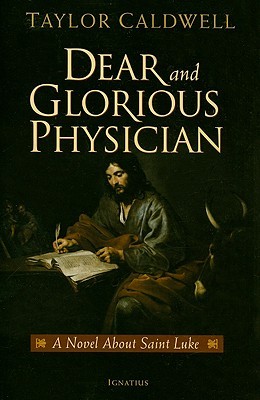Dear and Glorious Physician. Taylor Caldwell. 1958. 560 pages. [Source: Bought]
First sentence: Lucanus was never sure whether he liked or disliked his father. He was only certain he pitied him.
I wanted to love Dear and Glorious Physician. I did. In theory it sounds like it has the potential to be good--really good. It is a fictionalized account of the gospel writer Luke. (Luke wrote Acts as well.) But not all biblical fiction is biblical--this is something I've learned the hard way.
Lucanas, our narrator-hero, is Greek. His father and mother were former slaves. Lucanas became favored and essentially adopted by a Roman nobleman. He was trained as a physician. From an early, early age he was compassionate and empathetic. He never wanted to be a doctor to the wealthy, the elite, the privileged. He always wanted to be a doctor to the poorest of the poor, the socially unacceptable. (Slaves. Lepers. Prisoners.) From a young age his touch was a healing touch. Long before he learned of a Jewish Messiah, long before he learned of Jesus' teachings, his life, his death, his resurrection, long before he started calling on God and placing his trust in him, he was healing people. He continues to heal people after he hears 'the gospel' as well. In these healings Caldwell does not show Lucanas healing in the name of the Lord Jesus Christ. He doesn't bow his head and pray silently. He just heals. He even raises a girl from the dead. In one instance, Lucanas "feels virtue" leaving his body as he heals. This is just bizarre and all kinds of wrong.
The last third of the book shows Lucanas traveling around interviewing eyewitnesses--men and women who has seen the Lord Jesus Christ, heard him, followed him, knew him. One of the longer interviews is with Mary and other family members. There we learn that Mary was eternally innocent and that she was not conceived in sin and had never sinned. Again. All kinds of wrong.
Lucanas has an unfavorable opinion of James and John and some of the other disciples. He mentions how he thinks that they will get Jesus' teachings wrong in the name of evangelism. How they will let their own agendas shift the focus from what Jesus actually taught. Again. All kinds of wrong.
The first two-thirds of the novel weren't WRONG so much as slightly tedious and boring. The last third of the novel was wrong more often than right. Some things subtly off from Scripture, some things out and out OFF. (For example, when she had Lucanas meet John he was YOUNG and yet had already received the visions of Revelation. Saul was still Saul--not Paul. Saul hadn't met the apostles in Jerusalem yet. Saul hadn't begun his ministry yet. But John had received the visions of the last days?! Going back to Saul for a minute....Saul hadn't begun his ministry yet but had already received his calling to minister to the gentiles only????)
I honestly don't know if Taylor Caldwell even read Luke and Acts before she wrote this book. Perhaps this imaginative retelling takes into consideration some bad theological works of Caldwell's time?
© Becky Laney of Operation Actually Read Bible


3 comments:
I read Dear and Glorious Physician when I was fourteen years old. It eventually led to a career in science and medicine. The book was not meant to be based on fact but rather inspired by fact. That was clear to me as a child. Clearly, I found the book inspirational and very interesting. I was never bored and actually could not put the book down at night.
It has been many years since reading "...Physician. " Thank you for challenging my memory. I do not recall how "The Perpetual Virginity" of Mary was revealed, but I am shocked that I let it pass.
"This is a work of fiction..." is usually mentioned pretty soon after opening the cover. Since the book was a memorable read, I feel a renewed interest in re-reading it.
Read this book many years ago, now rereading it. It’s like a new book to me, and I am enjoying it. She told quite a story, maybe more fictional, than not.
Post a Comment